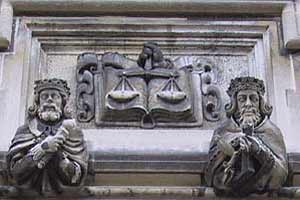Stone warns of threat to civil liberties, should history repeat
By Peter SchulerNews Office
 |
He believes U.S. history offers valuable and cautionary lessons for today’s national leaders as they now deal with a terrorist threat and a possible war with Iraq.
“A careful look at our own history shows that when faced with the pressures, anxieties and fears of a wartime climate, we have tended repeatedly to err on the side of restricting civil liberties, in a way that may have seemed appropriate and reasonable at the time, but which later we frequently came to regret,” Stone said.
As a result of his research, Stone will publish a book, to be released by W.W. Norton in 2004, which will explore six pivotal national emergencies in the history of the United States: the passage of the Alien and Sedition Acts in 1798, the Civil War, World War I, World War II, the Cold War, and the Vietnam War.
“The challenge,” Stone said, “is both to understand the dynamics that led to the sometimes draconian responses to a crisis and then to figure out how to avoid the repetition of such responses in the future, without going too far in the other direction and sacrificing vital security interests.”
In current crises, the Bush administration, Stone said, has employed secrecy to an unprecedented degree, far more than in the six national emergencies examined in his book.
But Stone said his research has given him some cause for optimism because he found that the country has tended to do better over time. Yet he also is concerned because, he said, “the temptation to fall into the same pattern is still very much with us.”
He explained that further acts of terrorism would likely lead to increasingly angry and frightened public opinion and official responses that have been historically predictable: primary anger and sanctions will be directed against those who are “similar” to those thought to be responsible, with secondary anger targeted at those who are thought to be sympathetic to them, and those who question the steps that government may take to deal with the problem.
“Public anger, fear and hysteria combined with government manipulation has produced the most dangerous situations,” Stone said. “One of the things we can learn from the past crises–such as the Alien and Sedition acts, the suspension of habeas corpus in the Civil War, the broadscale suppression of dissent in World War I and the internment of 120,000 Japanese-Americans during World War II–is that it is essential that there be respected voices of moderation and restraint–particularly within the administration–who can effectively advocate the importance of civil liberties. The complete absence of those voices in the current administration is troubling.”
Stone does give high marks to President Bush for his “almost letter-perfect response to the risk of possible hostile public reactions against Muslims and Muslim-Americans immediately after 9/11,” which he contrasts with President Wilson’s inflammatory rhetoric about German-Americans in World War I and President Franklin Roosevelt’s treatment of Japanese-Americans in World War II.
However, Stone said he is concerned that the administration’s strategy to maintain a pervasive cloak of secrecy on most of its actions related to terrorism, including detention and deportation proceedings, is a highly dangerous and effective tool to mute dissent.
“It is extremely difficult for responsible citizens to evaluate and criticize the actions of the government if it simply denies them the information they need to meet their responsibilities as citizens in a self-governing society,” Stone said.
Though Stone readily acknowledges that “the threat of terrorism is real and we expect our government to protect our safety,” he pointed to words of Justice Louis Brandeis to guide us today: “Those who won our independence…knew that… fear breeds repression” and that “courage is the secret of liberty.’
“Those, I think, are the two most fundamental insights for us to bear in mind,” Stone concluded.
![[Chronicle]](/images/sidebar_header_oct06.gif)